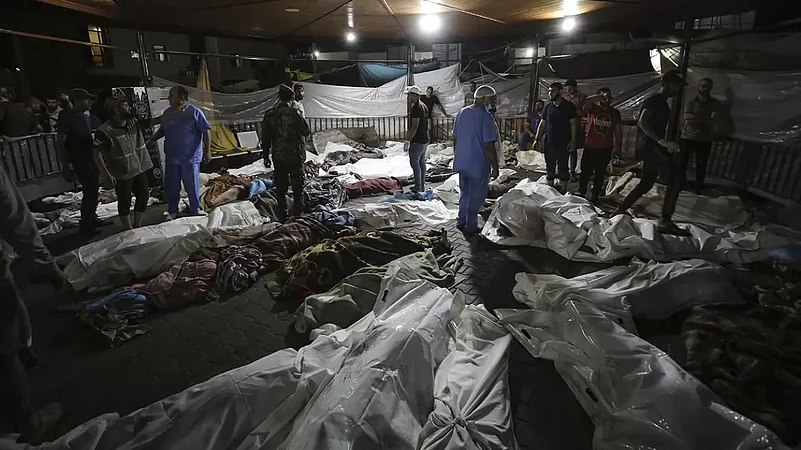The Al-Ahli Baptist hospital, lying in the centre of the besieged Gaza Strip, is the only independent, Christian-led medical facility in the region. Founded in 1882, the hospital runs a free program for breast cancer detection and provides free medical care and food to people in nearby towns and villages, according to the Jerusalem diocese’s website. “With well-tended grounds, it is a haven of peace in the middle of one of the world’s most troubled places,” the website says. But on October 18, an Israeli airstrike hit this safe haven, killing at least 500 people.
The hospital was crowded both with victims of 10 days of Israeli airstrikes and with families and others seeking refuge, as they believed, or rather hoped, that the hospital grounds were safer than their own homes. “People left their homes thinking they were more dangerous and they move to our schools and hospitals to be safe. And in one minute, all of them have been killed at a hospital,” Dr Ziad Shehadah told Al Jazeera.
Gaza's Hamas-run Health Ministry blamed an Israeli airstrike for the attack but Israeli authorities soon after denied involvement, saying a misfired Palestinian rocket appeared to be to blame.
The hospital was already in a dire condition amid a constant barrage of Israeli airstrikes after the Hamas attack on October 7. “On October 7 at 6.30 am, the people of Gaza woke up scared, witnessing a horrible situation,” hospital director Suhaila Tarazi wrote in an appeal, adding that they later realised the gravity of the situation when Israeli government declared it would respond to the Hamas attacks with a huge retaliation against Gaza and Palestinian fighters.
A day after, the hospital issued a fundraising appeal, saying it urgently needed medicines and other supplies for emergent patients that the staff predicted would rush through their doors amid escalating violence. “The situation is severely critical, and the consequences for people in Gaza are very bad, particularly in the health sector. The Ministry of Health has triggered an emergency situation and asked all health-service providers to increase their emergency response capacity. Life in Gaza is paralysed, with all institutions and private sectors closed, affecting the people's access to basic needs, particularly health,” the appeal said.
The hospital has merely 80 beds, but was a safe space for its patients. About 3500 outpatient visits, 400 inpatients and 300 surgeries were part of the hospital’s monthly functioning. It used to run a completely free of charge program for early detection of breast cancer among women above 40 years of age. Tuesday’s strike landed on this cancer treatment center, severely damaging two floors where the ultrasound and mammography wards are. Eileen Spencer, head of the American fundraising arm for the diocese, told The Washington Post that after the strike, “we don’t know if the hospital will still be standing.”
Presiding Bishop Michael Curry, leader of the Episcopal Church, which is the U.S. branch of the Anglican Communion, recalled how during his visit to the hospital in 2018, the “staff were passionately committed to anyone who had need”.
“I ask you to pray fervently for the birthplace of the Abrahamic faiths and for all its people. Pray for those who have been hurt, harmed, or killed — regardless of who they are or who did it,” he continued. “Pray also for the leaders and people of the entire region, that they will find the way to a just peace where all may live in safety and security as God intends.”
The United Nations, its top leaders and agencies have expressed horror and strong condemnation over the targeting of the hospital and killing of hundreds of civilians, underscoring that attack on hospitals or civilian infrastructure is against international humanitarian law and called for holding those responsible to account.


























